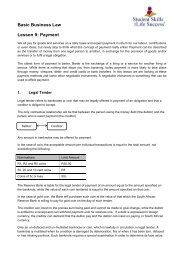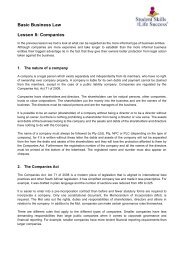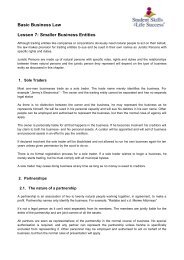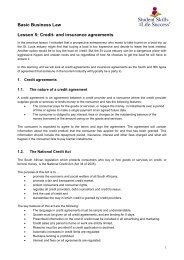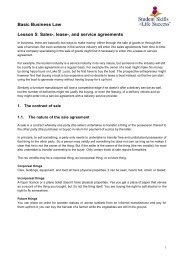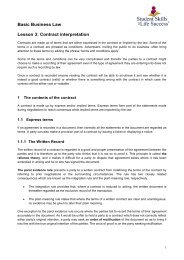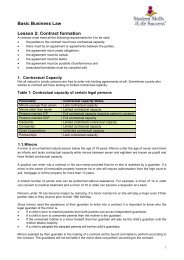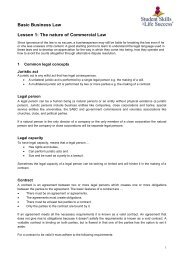Basic Business Law. Lesson 4. Contractual Performance
This is the fourth lesson of the "Student Skills for Life Success" "Basic Business Law" course. The topics covered in this booklet are: 1. Agency 2. Performance 3. Contractual breach
This is the fourth lesson of the "Student Skills for Life Success" "Basic Business Law" course. The topics covered in this booklet are:
1. Agency
2. Performance
3. Contractual breach
Create successful ePaper yourself
Turn your PDF publications into a flip-book with our unique Google optimized e-Paper software.
<strong>Basic</strong> <strong>Business</strong> <strong>Law</strong><br />
<strong>Lesson</strong> 4: <strong>Contractual</strong> performance<br />
Now that you have an idea how contracts are formed and interpreted, we can have a look at performing the<br />
obligations that arises from the contract. The performance of these obligations remain the responsibility of<br />
the parties to the contract.<br />
It could sometimes happen that the legal person on which the obligation rest has to fulfil that obligation<br />
through an agent or is unable to perform the obligation for some reason. So it could be argued that<br />
knowledge of the law of performance is the most important component of contractual law for a lay person.<br />
1 Agency<br />
A legal person can perform most juristic acts through a representative (agent). Legal entities like companies,<br />
close corporations or estates must necessarily act through a representative that is a natural person.<br />
1.1 The nature of representation<br />
Representation occurs where one person concludes a juristic act on behalf of another, with a third party. The<br />
person who is represented is called the principal and the person who represents the principal is called an<br />
agent. Once the representative act is completed’ it is the principal that is legally bound to the third party and<br />
not the agent.<br />
The requirements for an act of representation are the following:<br />
• The principal must exist,<br />
• the agent must have authority to perform the juristic act and<br />
• the agent must make it clear that he is acting on behalf of someone else.<br />
An agent does more than to pass information from one person to another as a messenger and is not limited<br />
to perform only a specific task, on behalf of someone else, as a mandatory.<br />
A person without legal capacity cannot represent another, but a person with limited contractual capacity can,<br />
as he binds the principal and not himself. Anyone with contractual capacity can appoint an agent to act on<br />
his behalf.<br />
1.2 Authority<br />
Authority can be given in writing, verbally or even through non–verbal conduct, as long as there is a<br />
manifested intention that the other party performs a juristic act or acts on behalf of the principal.<br />
Authorisation is a unilateral juristic act, which is a legal act that requires, and is performed by, one legal<br />
person.<br />
Other sources of authority include the following:<br />
• For a company, the articles of association,<br />
• for a close corporation , membership of the close corporation and<br />
• for a partnership, the contractual relationship between the partners.<br />
The given authority may include the power to delegate to a sub-agent, where the sub-agent is as capable to<br />
perform the juristic act as the agent.<br />
1
An agent’s authority terminates when …<br />
• the source of authority ceases to exist,<br />
• the period for which it was given lapses,<br />
• the agent performs the act for which authority was given,<br />
• the principal dies, becomes insane or goes insolvent,<br />
• the principal undergoes a change of status which diminishes his legal capacity,<br />
• the authority is revoked or<br />
• the agent becomes insane.<br />
Example<br />
A tour operator will typically book a flight for tourists, arrange for the transfer from the airport to the hotel and<br />
design a tour itinerary for their clients. In doing so the tour operator inevitably acts as an agent for a variety of<br />
other businesses.<br />
1.3 Ratification<br />
Ratification is a unilateral juristic act where the principal expresses his intention that an agreement, entered<br />
into by an agent without the principal’s authority, be regarded as if it was duly authorised.<br />
Example<br />
Sandy is aware that her friend Wendy wants to sell her car but has not been authorised by Wendy to act as<br />
her agent. One night she speaks to another friend, Joan, and discover that Joan is looking for the exact car<br />
that Wendy wants to sell. She claims to be representing Wendy and agrees with Joan on a price for Wendy’s<br />
car.<br />
When Sandy tells Wendy about the agreement, she can ratify the agreement in its entirety and sell the car to<br />
Joan as if Sandy was indeed properly authorised to act on her behalf. If she doesn’t want to sell the car to<br />
Joan under the agreed terms, the contract will be void, but Joan will have a claim for damages against<br />
Sandy.<br />
Ratification must adhere to the following requirements.<br />
• The principal must have been in existence when the agreement was made.<br />
• The agent must have professed to be contracting as a representative.<br />
• The principal must have the capacity to ratify.<br />
• The principal must ratify the contract in its entirety.<br />
• The ratification must take place within a reasonable time.<br />
Ratification is not possible when…<br />
• A statute requires agent’s authority.<br />
• The principal can no longer enter into the contract himself.<br />
• The principal lacks capacity to enter into the agreement.<br />
• The agreement is illegal.<br />
1.4 Estoppel<br />
Estoppel occurs when the courts precludes the principal from escaping liability when he refuses to ratify an<br />
unauthorised contract entered into by someone claiming to be an agent.<br />
2
The requirements for estoppel are the following:<br />
• The principal represented to the third party that the agent did have his<br />
authority or he kept silent when he was under a duty to speak,<br />
• the representation misled the third party into believing that the agent was authorised and<br />
• the third party acted on the strength of the presentation.<br />
A principal held liable in terms of estoppel will have legal recourse against the agent.<br />
Example<br />
Sandy use to be an agent of car dealer Wendy but has since left her employ. She is still aware of a car that<br />
Wendy wanted to sell. One night she speaks to a friend Joan and discovers that Joan is looking for the exact<br />
car that Wendy wants to sell and agrees terms of sale with Joan. Joan had bought cars from Wendy through<br />
Sandy before and when she saw Wendy a week ago Wendy indicated to Joan that Sandy was a great agent,<br />
even though Sandy had already left her employ.<br />
Wendy may refuse to ratify the agreement in its entirety based on the fact that Sandy wasn’t authorised to<br />
act on her behalf. Joan can then approach the court and stop Wendy from escaping the liabilities that was<br />
created by the agreement, because all Wendy’s actions gave her the impression that Sandy was indeed still<br />
her agent.<br />
1.5 Liability of the unauthorised agent<br />
If someone claims to be an agent but acts without authority such a person will not be bound to the contract<br />
entered into, but the third party may hold him liable for the following damages:<br />
• Damages for breach of contract<br />
• Delictual damages for misrepresentation and<br />
• Damages for breach of an implied warrantee.<br />
1.6 The doctrine of the undisclosed principal<br />
An agent must make it clear that he is acting on behalf of another legal person or the principal will not be<br />
bound by the contract.<br />
The doctrine of the undisclosed principal states however that the principal is entitled to step into the shoes of<br />
an authorised agent, once consensus with the third party was reached, and reveal that he is indeed the real<br />
party to the contract.<br />
The following requirements must be met:<br />
• The agent must be authorised,<br />
• the agent must intent to act in the principal’s behalf,<br />
• the agent must fail to disclose his representative capacity,<br />
• the agent must be acting on behalf of one principal only,<br />
• there may not be any clause in the contract disallowing the doctrine and<br />
• the third party doesn’t have a good reason for wanting to contract with the agent personally.<br />
3
Example<br />
Wendy wants to sell her car and have authorised her friend Sandy to sell the car<br />
on her behalf if the opportunity presents itself. One night Sandy speaks to her friend Joan and discovers that<br />
Joan is looking for the exact car that Wendy wants to sell. Joan and Sandy then conclude an agreement for<br />
the sale of the car, but Joan thinks the car is Sandy’s.<br />
Wendy can now be revealed as the real owner of the car and will be contractually bound to Joan, as it can<br />
be argued that Joan would have agreed to the terms of sale regardless of with whom she was contracting<br />
with.<br />
2 <strong>Performance</strong><br />
2.1 The form and manner of performance<br />
<strong>Performance</strong> must take the form specified in the contract unless it is clear that the parties contemplated<br />
performance of an equivalent kind. A person cannot be compelled to accept another article even if the<br />
substituted article is as good as or better than, the article stipulated, and it is difficult, inconvenient, or expensive,<br />
for the seller to deliver it.<br />
2.2 The time of performance<br />
If a date for payment is fixed the debtor has until the last moment of that day to make payment, even if it is<br />
agreed that payment may be made by cheque.<br />
Where no time for performance is agreed upon, then performance must be rendered immediately or within a<br />
reasonable time depending on the case.<br />
Common law allows a debtor to pay the debt before the stipulated payment date if the future payment date<br />
was inserted in the contract purely for his benefit.<br />
If it is shown that the time provision was inserted for the benefit of the creditor as well, as is normally the<br />
case with interest bearing loans, then the creditor may refuse to accept early payment unless the debtor also<br />
pays interest on the amount of the debt up to the stipulated date of payment. - In respect of certain debts,<br />
statute has intervened to allow a debtor to make early payment and secure a recalculation of interest.<br />
If the debtor and creditor undertake to render reciprocal performances under the contract the debtor is not<br />
obliged to perform unless the creditor has either performed or tendered to perform his own obligation.<br />
2.3 The place of performance<br />
Where the parties have not agreed on a place for performance but have fixed a time, the debtor must seek<br />
out the creditor for the purpose of rendering the performance to him. Where neither a place nor a time for<br />
performance is agreed upon, the creditor is obliged to seek out the debtor to obtain performance.<br />
4
2.4 The person who must render performance.<br />
In general performance may be rendered by an agent of the debtor or by a third person without the authority<br />
or knowledge of the debtor unless it is clear from the terms of the contract, the nature of the performance to<br />
be rendered, or other surrounding circumstances, that it is the debtor himself who must render the<br />
performance in question. If, for instance, one hires a particular architect to design a building then, the<br />
architect may not delegate the work to another person.<br />
2.5 The person who must accept performance.<br />
If the creditor names a third party as his agent to receive the performance, the debtor may render<br />
performance to the agent, but is not obliged to do so.<br />
If the parties agreed that performance may or must be rendered to a third party, the creditor is not entitled to<br />
unilaterally prohibit performance to the third party and claim the performance to except in the following<br />
cases:<br />
• Where the debtor has no interest in performing to the third party.<br />
• Where the creditor will suffer loss if the performance is rendered to the third party.<br />
If the debtor performs to a person to whom the creditor owes a debt without the creditor's consent and the<br />
creditor ratifies the receipt of performance by that person, then the debtor is discharged, but if the creditor<br />
declines to ratify the receipt of the performance, the position is unclear.<br />
Example<br />
Tom owes Dick a money debt of R500, and Dick owes Harry a money debt of R1000. Harry convinces Tom<br />
to pay him the R500 instead of paying it to Dick and Tom agrees.<br />
If Dick ratifies the agreement that Tom made with Harry on his behalf, Tom will not owe Dick anything and<br />
Dick will owe Harry only R500.<br />
2.6 Payment where more than one debt due<br />
Where the debtor owes more than one debt to the creditor and makes a payment which is insufficient to<br />
discharge all the debts, he must indicate expressly to which debt/s his payment is to be applied.<br />
If he gives no such indication and the circumstances do not suggest an appropriation, the creditor is entitled<br />
to choose the debt to which to apply the payment provided he informs the debtor of his intentions at the time<br />
that the debtor makes his payment and gives him an opportunity to stipulate otherwise.<br />
If the creditor does not make an appropriation in this manner, he is required to apply the payment to the most<br />
onerous debt or, if the debts are equally onerous, to the oldest of them, or, if equally burdensome and old, to<br />
all the debts proportionately.<br />
An exception is made to the rule that the payment must be appropriated to the most onerous debt where the<br />
debts are capital and there is interest thereon. The creditor must first credit the account relating to interest<br />
before that of the principal sum.<br />
5
2.7 Proof of performance<br />
If a party alleges that he has rendered performance the onus is on him to prove it.<br />
2.8 <strong>Performance</strong> frustrated by the creditor<br />
If the debtor tenders proper performance to the creditor and the latter refuses it, the debtor is not regarded as<br />
being in breach of his contractual obligation and cannot be held liable for non-performance.<br />
The same principal applies where the creditor makes it impossible for the debtor to perform in accordance<br />
with the terms of the contract. For example, if someone provides a delivery address for the delivery of a<br />
product that he bought but is not at the address to take the delivery, the deliverer will not be in breach of the<br />
agreement.<br />
3 <strong>Contractual</strong> Breach<br />
3.1 Excuses for Non-<strong>Performance</strong><br />
In certain cases, a party is excused from carrying out his side of the contract and, therefore, is not subject to<br />
the remedies for breach of contract.<br />
Set-off<br />
A party is excused from performing if the other party owes him a debt as well and the second debt can be<br />
set-off against the first party's debt.<br />
For set-off to operate the following requirements must be met.<br />
• The parties must be indebted to each other only,<br />
• they must owe and be owed in the same capacity,<br />
• the debts must be of the same kind,<br />
• the debts must be due and enforceable and<br />
• the debts must be fixed by agreement or by a law or must be capable of being easily and promptly<br />
proved.<br />
If the requirements are met, set-off operates automatically and does not have to be raised or invoked by one<br />
of the parties.<br />
Merger<br />
A person cannot be his own creditor or debtor. If the qualities or capacities of debtor and creditor concur in<br />
the same person in respect of the same obligation, the obligation is extinguished. So, for example, if a lessee<br />
of property acquires ownership of the property, the lease ceases to exist and he is no longer liable for rent.<br />
Supervening impossibility of performance<br />
If, once the contract has been entered into, it becomes physically or legally impossible for the debtor to<br />
render his performance, he is excused from doing so.<br />
Physical impossible of performance is judged according to the standard of reasonableness. For example, a<br />
supplier of bricks would not be expected to deliver them by air, if this were the only means of transport<br />
available.<br />
6
An obligation becomes legally impossible to execute, if the law ceases to<br />
recognize or make provision for the performance in question.<br />
The debtor cannot escape liability on the basis of supervening impossibility of performance if …<br />
• He is himself responsible for the impossibility<br />
• He expressly or tacitly guaranteed performance or<br />
• He assumed the risk that performance might become impossible.<br />
If the debtor is excused from rendering performance because of supervening impossibility, the creditor is<br />
simultaneously discharged from liability to perform any reciprocal obligation resting on him.<br />
Prescription<br />
A debtor is not legally bound to perform in terms of an obligation which has prescribed. The Prescription Act<br />
of 1969 states that a debt is extinguished after the lapse of that period of which applies to the type of debt in<br />
question.<br />
The periods of prescription of debts are the following:<br />
• 30 years in respect of any debt secured by mortgage bond, any judgment debt, any debt in respect<br />
of taxation or any debt owed to the State in respect of mining rights<br />
• 15 years in respect of any debt owed to the State, arising out of an advance, loan or the sale or<br />
lease of land<br />
• 6 years in respect of a debt arising from a bill of exchange, other negotiable instrument or from a<br />
notarial contract<br />
• 3 years in respect of any other debt<br />
If a debt qualifies in more than one of the categories, the longer period will apply and if a debtor pays his<br />
'debt' after it has been extinguished by prescription, the payment is regarded as valid and the debtor is not<br />
entitled to recover it.<br />
Failure of creditor to perform reciprocal obligation<br />
Where both parties to a contract undertake to render performances, the principal of reciprocity or<br />
dependence of promises usually applies. One party is excused from performing his obligation until the other<br />
has either performed or tendered to perform the obligation resting on him.<br />
For example: In the case of a contract to perform a piece of work, the owner is not obliged to pay the<br />
contractor until he has completed the work, (unless of cause the agreed otherwise).<br />
Death<br />
The death of a party is not an excuse for non-performance. The rights and obligations of the deceased<br />
arising under a contract are transmitted to his estate which is administered by an executor.<br />
However, if performance could have been only to the creditor himself, or only by the debtor himself, then the<br />
death of the creditor or debtor, as the case may be, renders performance in terms of the contract impossible,<br />
and hence discharges it.<br />
Example 1<br />
Joe hires Jimmy to represent him in a legal matter but dies halfway through the trial. - There is no one else<br />
that Jimmy can render the performance to and so performance becomes impossible.<br />
7
Example 2<br />
Joe hires Jimmy to represent him in a legal matter, but Jimmy dies halfway<br />
through the trial. - If Joe hired Jimmy because of his expertise, performance would again become impossible,<br />
but if Jimmy was part of a legal partnership and Joe didn’t care who represented him, the partnership would<br />
not be discharged from its responsibilities just because if Jimmy’s death.<br />
Insolvency<br />
As a rule, the insolvency of a party is not, per se, an excuse for non-performance. The insolvent's trustee has<br />
an election whether to abide by the contract or terminate it. If he adopts the former course, the trustee steps<br />
into the shoes of the insolvent and must render full performance of the obligations due by the insolvent in<br />
terms of the contract.<br />
3.2 Forms of breach<br />
Failure to perform (mora)<br />
A debtor may fail to perform on or before the date fixed for performance. For example: the lessee of<br />
premises may neglect to pay the rent by the stipulated date in the contract. It is said that the debtor is in<br />
mora in respect of the obligation in question.<br />
If no definite time for performance is agreed upon the debtor only fall into mora once the creditor has<br />
demanded performance within a specified time, and the debtor has failed to perform within that time.<br />
Incomplete or defective performance<br />
The debtor may render performance on time but deviate from the performance required by the contract. For<br />
example: the builder of a house may depart from the agreed specifications or use materials of inferior quality.<br />
Repudiation<br />
The debtor may repudiate his obligation by making it plain by his words or actions that he does not intend to<br />
perform, or perform properly, in terms of the obligation. For example: the seller of an article informs the buyer<br />
that he has decided to keep the article or to sell it to someone else.<br />
Prevention of performance<br />
The debtor may, by his conduct, put it beyond his power to perform. For example: a carrier of goods<br />
carelessly causes their destruction in transit and so renders it impossible for him to deliver the goods at the<br />
agreed destination.<br />
3.3 Remedies for breach<br />
Specific performance<br />
A specific performance order is an order compelling the defaulter to perform what he has undertaken to do or<br />
restraining him from carrying out what he has agreed not to do. (The latter order is called an interdict.)<br />
The right to specific performance is not absolute and the court cannot grant specific performance if it is<br />
impossible for the defaulter to perform. Even where the defaulter can carry out his performance, the court<br />
has discretion to refuse an order of specific performance if this would produce a result which is inequitable or<br />
contrary to public policy.<br />
8
Where the court refuses to order specific performance the innocent party may<br />
recover the benefit of his bargain by means of damages.<br />
Damages<br />
An award of damages is an order to pay a sum of money for loss suffered. The primary rule for determining<br />
contractual damages is that the innocent party may claim so as to be put in the economic position he would<br />
have occupied if the contract had been properly performed.<br />
He can recover the gains which he has not made and the actual loss which he has suffered as a result of the<br />
contract not being performed or performed properly. He may recover damages on this basis whether he<br />
cancels the contract on account of the breach or not.<br />
To succeed with a claim for damages for breach of contract, the innocent party must establish that he has<br />
suffered loss and that the loss was caused by the breach.<br />
According to the principal concerning mitigation of loss, the sufferer cannot recover damages for loss which<br />
he could reasonably have avoided. But the onus is on the defaulter to prove that the innocent party failed to<br />
take the steps which a reasonable person would have taken in the circumstances to mitigate his loss.<br />
Example<br />
“Tony’s Tour Guides” has an agreement with “Mandy’s Marvelous Tours” to provide guides in accordance<br />
with the tour packages that Mandy sells. In January Mandy sells a Gauteng tour package to ten German<br />
tourist to be done in September. In April Tony informs Mandy that he plans to relocate his business to<br />
Durban and will not be doing any more work in Gauteng from June onwards.<br />
According to their agreement Tony must give her 6 months’ notice in such an event and so Tony is reach of<br />
their agreement. Mandy cancels the tour in July and sues Tony for the full amount that she lost.<br />
Even though Tony is in breach of their agreement and it is Mandy’s right to take legal action, she has a duty<br />
to mitigate her loss. She had ample time to find another provider of tour guides or could have collaborated<br />
with another tour operator.<br />
Therefor it is unlikely that the court will award her the claim for the full amount of the loss suffered.<br />
Cancellation (rescission)<br />
Breach, no matter how serious, does not, per se, terminate the contract. This is so, even if the contract<br />
contains a provision to the effect that, in the event of the default in question occurring, the contract will<br />
become null and void.<br />
It is only where the innocent party cancels the contract on account of the breach that it comes to an end. In<br />
the absence of cancellation, each party remains liable to carry out or complete his respective performance<br />
although, if the innocent party claims damages in lieu of performance, the defaulter is relieved of his duty to<br />
perform.<br />
9
Penalty<br />
To spare the creditor the difficulty and cost of proving a claim for damages, and<br />
also to persuade the debtor to fulfil his part of the bargain, the creditor may insist that the contract includes a<br />
clause to the effect that, if the debtor breaches his obligations, he will be liable to pay a sum of money or<br />
render a performance to the creditor which he would not otherwise have had to pay or render.<br />
For example, in a contract to erect a building, the owner may insert on a clause that, if the contractor fails to<br />
complete the work by a stipulated date, he must pay R1 000-00 per day to the owner for every day that the<br />
work remains unfinished after that date.<br />
This type of provision is called a penalty stipulation, and the money or performance which must be paid or<br />
rendered, a penalty. Penalty stipulations are governed by the Conventional Penalties Act of 1962.<br />
10










